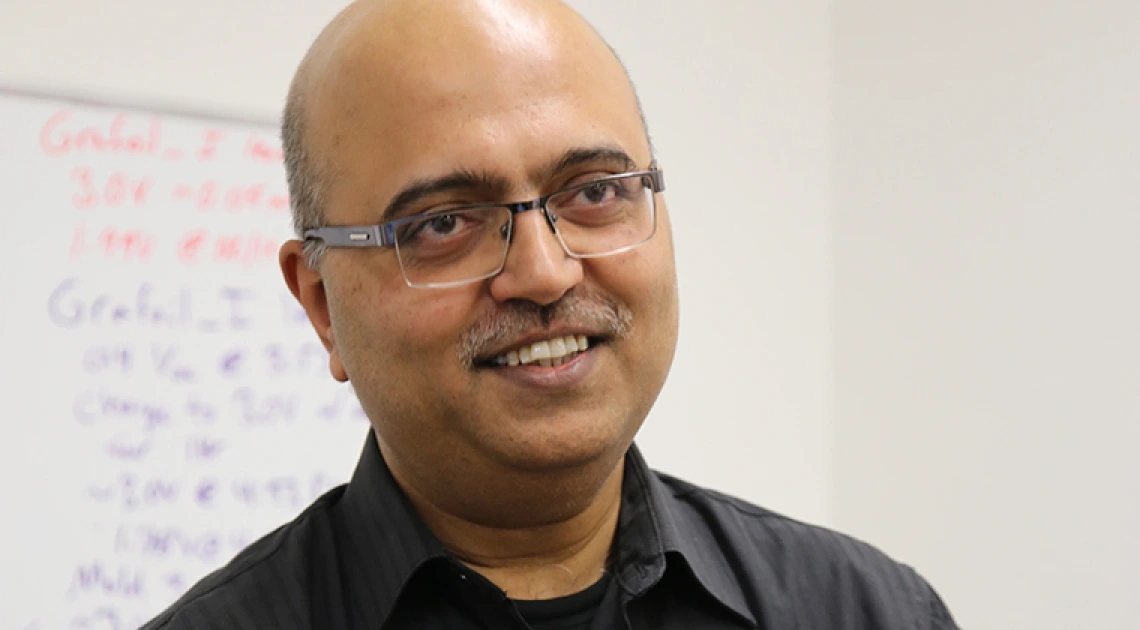Mesa-Based Startup Forges Ahead on Battery Technology Licensed from University of Arizona

Tucson, Ariz. – Mesa-based Urbix Resources(link is external) has licensed a portfolio of lithium-ion battery and related materials technologies invented at the University of Arizona (UA). The technologies – an environmentally friendly low-temperature graphite purification technique first commissioned by Urbix Resources, a new electrode architecture, an electrolyte, and a graphene exfoliation reactor — were all developed by Dr. Palash Gangopadhyay(link is external) in his role as adjunct research professor at the UA College of Optical Sciences (OSC). He is now the full-time CTO at Urbix, overseeing the commercialization of these technologies.
“Essentially,” says Dr. Gangopadhyay, “this graphite purification technology can make current processes to make lithium-ion battery grade anode material safer, more environmentally friendly and more cost effective, ultimately enabling lithium-ion battery’s true potential as a sustainable technology.”
According to Urbix executive chairman and co-founder Nico Cuevas(link is external), the inventions are transformational for the energy storage industry. The company has made a fundamental jump beyond its original graphite commercialization business model to bring these new materials and battery cell designs to market.
Gangopadhyay was a research scientist at the UA when he and his colleagues originally created the electrode technology. TLA provided funding via its Asset Development program to verify the performance of the new electrode technology to help entrepreneurs and investors understand its commercial potential and bring it closer to market readiness. Through a sponsored research project in 2015, Urbix commissioned the UA to develop processes for graphite purification and graphene exfoliation.
“This intellectual property package has helped bring Urbix into a new era,” says Amy Phillips, licensing manager for Tech Launch Arizona (TLA), the office of the UA that commercializes inventions stemming from research. “They have smart people, bright ideas and great graphite. The UA gave them the edge they need to go all the way.”
Urbix learned of Gangopadhyay's expertise in using graphite and provided additional funding to perform assays on their graphite at OSC. Through that project, they became familiar with the battery technology Gangopadhyay had developed, which had expanded to include a novel electrolyte. In combining their ideas, Urbix realized there was an opportunity to produce a superior battery with a localized vertically integrated raw material supply chain.
“The batteries being developed in our Mesa lab right now are more efficient, safer and longer lasting than current technologies,” says Adam Small(link is external), Urbix CEO and Co-founder.
The Urbix batteries have shown stability at greater than 5.2 volts, a goal industry giants are seeking by 2024. “This is a huge step forward for electric vehicles and utility storage,” he says. “Batteries today are considered a consumable, but with our technology they will be classified as long-term assets, which is critical for renewable energy, IoT infrastructure and financing.”
While current comparable top-of-the-line batteries can last between 500 to 3000 cycles of charging, the new UA/Urbix-invented batteries can exceed 7,000 cycles while still maintaining a greater than 95 percent specific capacity. More importantly, this technology has been vetted for over five years, unlike many new battery innovations that lack testing longevity and performance confidence.
“With a 15 to 20-year battery life as opposed to three,” says Small, “we’re creating a product that results in less waste in our landfills, and is a more viable solution for electric vehicles, aerospace and utility storage applications.”
Small graduated from the UA Eller College of Management in 2012, after which he became an entrepreneur and co-founded a number of companies, most recently co-founding Urbix in 2014 alongside UA Engineering Management alumni Nico Cuevas, Sergio Aguirre, Javier Ayala and Luis Ramos, and raising $2 million to-date. While at the UA, Small won a national championship in swimming, and now at 28, he has been named one of Forbes 30 Under 30 in the energy sector(link is external) for 2018.

